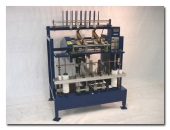I wouldn't say impossible just perhaps impractical. People used to do a 100% of the processing on farm so obviously a small operation is possible. The problem is making it profitable. Even many of the mobile slaughter houses have gone bust. Most small farms need meat processing but how many need fiber processing? Say I have ten sheep or half a dozen Alpacas is it worth having a mobile operation show up and process my fiber? Say you need 3 people to handle processing. First you need to decide the services you want to offer. Do you shear or just turn the washed fiber into yarn? Cleaning Fleeces takes a lot of water so you need either a massive water tank or on farm access, then you need water disposal. Simply turning fiber into thread is the easiest but still it's a lot of labor. I just looked it up and sheep range from 2 to 30 pounds so say 15 on average so 10 sheep would be 150 pounds of fiber. It seems like normal wool is worth around $15 a pound in yarn so your 150#s is worth $2250. If your three people make $250 a day which isn't much and your rig costs a $1000 a day that's $1,750 in hard costs just to show up and do the day. Even at a very modest of $250 profit you're still at $2,000 it'll cost the farmer so he'd need to spend a total of $250 on ten sheep just to break even. The numbers are much worse if you're processing 3 to 5 animals. What if you're processing a 100 to 500 animals? Well then either the farmer sets up to do it themselves or they haul animals to a factory processor who can keep costs down with volume. I can see it making sense for high value fibers like Angora and High quality Alpaca but not for cheaper fibers. The biggest problem is having enough farmers in the area to cover the costs. If you have to drive 3 hours to the farm you just blew half the day on the road. Now if you had a really large rig and had a sheep enter the front and meat and yarn came out the back and you were doing 50 or a 100 animals at a farm it could work but most don't harvest the sheep they raise them for wool. I doubt most will hand you cleaned fleeces so water is your biggest problem. If you blow through 10,000 gallons of water that's a lot to dispose of and the state will want a disposal plan from you. Rather than mobile if you have enough people in your area to make it worth while then set up a processing plant and have them bring in their animals. This allows you to create a water disposal plan and means you don't have to try to cram everything into a small rig. For farmers who can't transport animals you could offer a taxi service to pick up and deliver. It would make more sense than a mobile processing plant.


